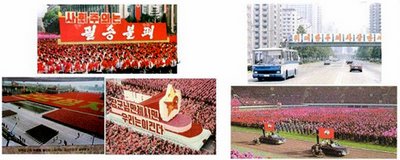Education International, the global federation of teachers unions, has issued a
protest to president Roh. EI is responding to the use of police intimidation, as well as the government's continuing avoidance of meaningful dialogue.
[2007-02-22]
Korea: Korea: government should involve teachers in social dialogueEI has written to the President of the Republic of Korea, expressing its concern about the disciplinary action taken against the 430 teachers who publicly protested against the imposition of the teacher evaluation system.
The government has refused to involve teachers in the development and implementation of a teacher evaluation system, prompting widespread criticism from the teaching community.
The 430 teachers took leave and rescheduled their classes to voice their protest by assembling outside the Ministry of Education.
However, they were forcefully taken away by the police, and were forced to accept financial penalties.
EI affiliate the Korean Teachers and Education Workerts Union - Jeongyojo communicated to EI that when the disciplinary committees of district education offices convened on 25 January, the teachers were refused the right to respond to the charges. Jeongyojo also reported police intimidation and the summary dismissal of the committees while teachers were delivering statements.
In its letter dated 21 Feb, EI asked the Government of Korea to involve teacher unions in the preparation and implementation of all education policies, and the penalty imposed on the 430 teachers be lifted.
Below is the content of EI's letter in English:
-----------------------------
H.E. Mr Noh Moo-hyun
President of the Republic
Korean Presidential House
Chongwadae
Seoul
Republic of Korea
By fax: +82-2-770-4937
Brussels, 21 February 2007
Dear Mr President,
Education International – the global union federation of teachers representing over 30 million members in 169 countries which has the Korean Teachers and Education Workers Union, KTU or JeonGyoJo, as one of its affiliates – is very concerned about the lack of social dialogue and attempts by the Korean authorities to restrain the activities of the teacher union.
Education International is alarmed by the disciplinary action of the Ministry of Education and Human Resources Development against 430 teachers who assembled to publicly protest against the imposition of the teacher evaluation system. This action was prompted by the refusal of the Ministry to involve the teacher union in the development and implementation of the teacher evaluation system.
Social dialogue is a cornerstone of democracy. Korea, as a member of the tripartite International Labour Organisation, is well aware that workers’ organisations (including teacher unions and associations) need to be consulted. The main goal of social dialogue is to promote consensus building and democratic involvement. "Successful social dialogue structures and processes have the potential to resolve important economic and social issues, encourage good governance, advance social and industrial peace and stability and boost economic progress," states the ILO.
Education International shares KTU's concern that the Ministry of Education developed a teacher evaluation system without input from teacher representatives. As education policies shape the present reality and future opportunities of students, these policies must be implemented only after careful, considered, and comprehensive discussion.
The Republic of Korea ratified ILO Convention 135 on Workers' Representatives which states "Workers' representatives shall enjoy effective protection against any act prejudicial to them, including dismissal, based on their status or activities as a workers' representative or on union membership or participation in union activities, in so far as they act in conformity with existing laws or collective agreements or other jointly agreed arrangements."
On the basis of the information provided by the KTU, Education International believes that the 430 teachers have respected the law of the country: they applied for legal holiday and rescheduled their class so that there would be no disruption of the school timetable. The disciplinary action against them, in the form of financial penalties, can be considered as unfair labour practice.
In addition, when the disciplinary committees of district education offices convened on 25 January, teachers were refused the right to respond to charges. KTU also reported police intimidation and the summary dismissal of the committees while teachers were delivering statements.
Education International invites the Government of Korea to authorise collective action by the teacher unions as long as the national law and Korea's international labour commitments are respected.
Education International respectfully asks the Government of Korea to involve teacher unions in the preparation and implementation of all education policies. Education International also asks that the financial penalty imposed on 430 teachers be lifted.
Education International sincerely trusts that this message is one your Government can support.
Sincerely yours,
Fred van Leeuwen
General Secretary



